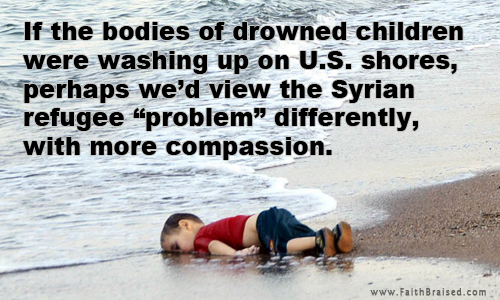“The Force is strong in my family. My father has it. I have it. My sister has it. You have that power too.”
- Luke Skywalker
Friday, in theaters everywhere, “The Force Awakens”, Episode VII of Star Wars, will begin with familiar words written in blue against the blackness of space—A long time ago, in a galaxy far, far away . . .
The Force has a light side and a dark side, and can be used for good or evil. We need to be reminded, now and then, that the greatest evil comes from within, not from what attacks us from outside. Any one of us, even the best of us, can give in to fear, anger and hatred. William Law, seventeenth century English writer, advised, “Love and pity and wish well to every soul in the world; hate nothing but the evil that stirs in your own heart.”
We may think of ourselves as the Good Guy, like Anakin Skywalker did in his early years. Thinking too highly of ourselves easily degenerates into self-righteousness. When we, like Anakin, think of ourselves as the wisest, the strongest, and the purest, we become obsessed with ourselves to the point of losing concern for others; we might even turn into an evil Darth Vader.
Jedi Master Obi-Wan Kenobi defines the Force as “an energy field created by all living things, surrounding and penetrating us, binding the galaxy together.”
God’s Force is not created by living things—the Creator himself is the Force energizing all life. “He has made us, and not we ourselves” (Psalm 100:3).
God’s Force surrounds us—his unfailing love sustains us on our journey through life. “The faithful love of the Lord never ends! His mercies never cease. Great is his faithfulness; his mercies begin afresh each morning” (Lamentations 3:22-23 NLT).
God’s Force binds the galaxies together—his unlimited power is displayed in his orchestration of interstellar space. “Look up into the heavens. Who created all the stars? He brings them out like an army, one after another, calling each by its name. Because of his great power and incomparable strength, not a single one is missing” (Isaiah 40:26 NLT). “Everything was created through him and for him. He existed before anything else, and he holds all creation together” (Colossians 1:16-17 NLT).
When God’s Force awakens in any of us, we’re challenged to channel it into concrete actions of justice and compassion. However, we cannot trust ourselves to stay in the light of God at all times. Each of us is a sinful, fallible human being, as susceptible to sin as was Anakin Skywalker on the path to becoming Dark Vader.
We cannot consistently bear good fruit with human effort alone—we require a Power greater than ourselves. Luke Skywalker realizes this when he suffers a monumental shock to his system—he discovers that Darth Vader is his father. Realizing he is cut from the same cloth as his father, he struggles with how good and evil can exist in the very same family. Aleksandr Solzhenitsyn (The Gulag Archipelago 1918-1956), wrote: “If only it were all so simple! If only there were evil people somewhere insidiously committing evil deeds, and it were necessary only to separate them from the rest of us and destroy them. But the line dividing good and evil cuts through the heart of every human being. And who is willing to destroy a piece of his own heart?”
Each of us desperately needs a powerful Leader to keep us on the right track, and to save us when we stray—none other than the Messiah. The Lord Jesus Christ penetrates believing hearts with the purifying, inspiring power of the Holy Spirit. If we’re going to actually follow Jesus and behave as his disciples in this dark world, we need to be illuminated by this Holy Spirit.
God’s Force is uplifting, hopeful, inspiring and challenging. It is not trapped in a galaxy far, far away—it is transforming hearts, making people more caring and compassionate, selfless and sacrificial. This Force is seen not only in events that happened a long time ago—it is at work today in hearts, homes, churches, schools, and communities.
God’s Force will win the last war in the battle between good and evil. “The light shines in the darkness, and the darkness can never extinguish it” (John 1:5 NLT).
God’s Force awakens most visibly in Jesus. It is strong in him, in his Father, and in all of us who follow him in faith and obedience.. “This light within you produces only what is good and right and true” (Ephesians 5:14 NLT). If we’re going to stay out of the shadows and walk in the light, we must rely on God’s Force.
“I want to walk as a child of the Light, I want to follow Jesus. God set the stars to give light to the world, The Star of my life is Jesus! In Him there is no darkness at all! The night and the day are both alike! The Lamb is the Light of the City of God—Shine in my heart, Lord Jesus!” (Kathleen Thomerson)
God’s Force alone can truly awaken our hearts. “Awake, O sleeper, rise up from the dead, and Christ will give you light” (Ephesians 5:9 NLT)
Johnny R. Almond
Interim Pastor, Hull’s Memorial Baptist Church; Fredericksburg, Virginia
Blog http://GentleWhispersFromEternity-ScripturePersonalized.com/


